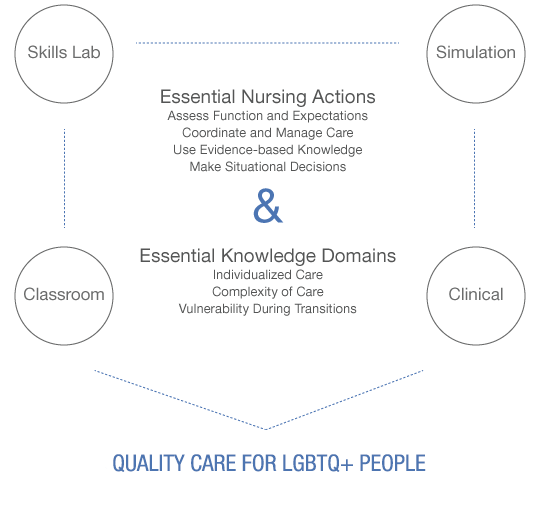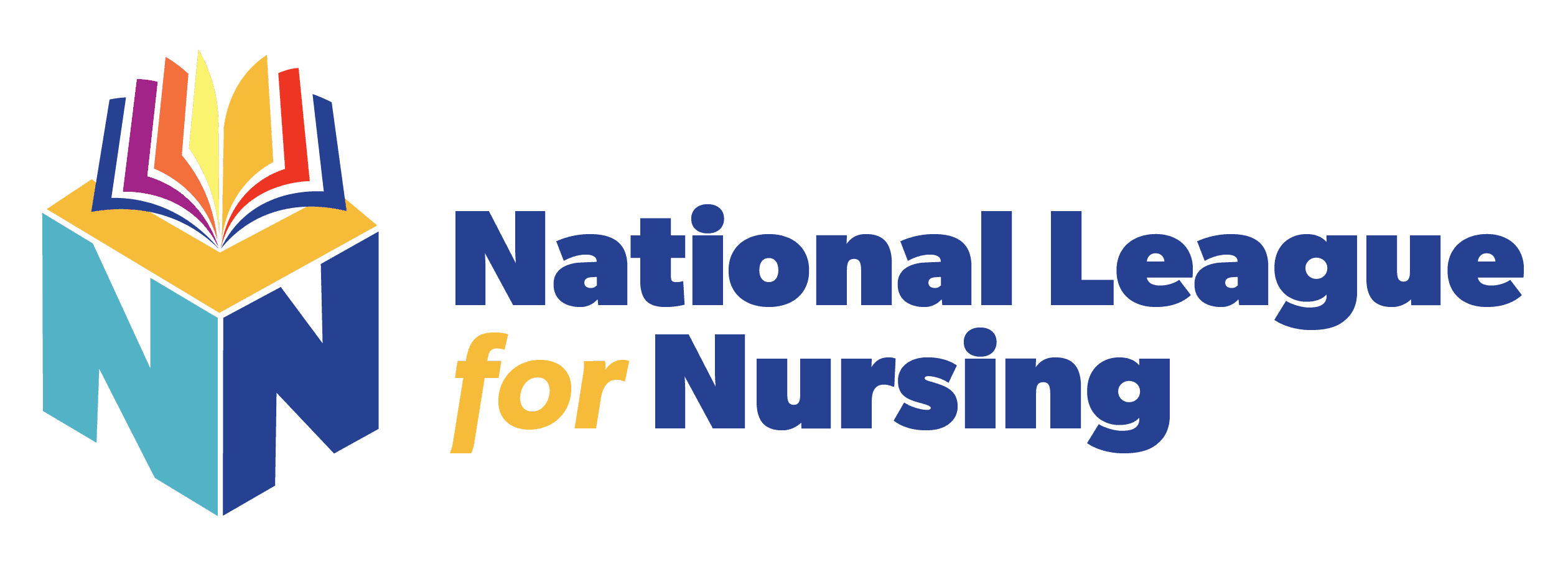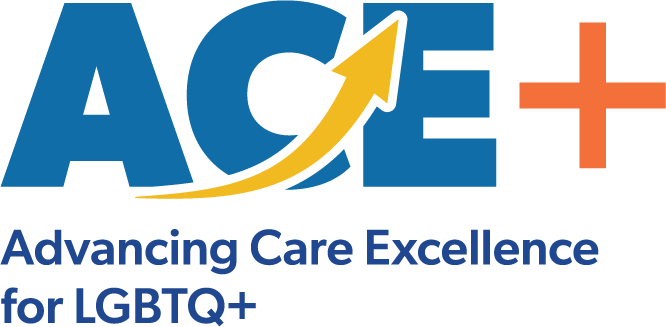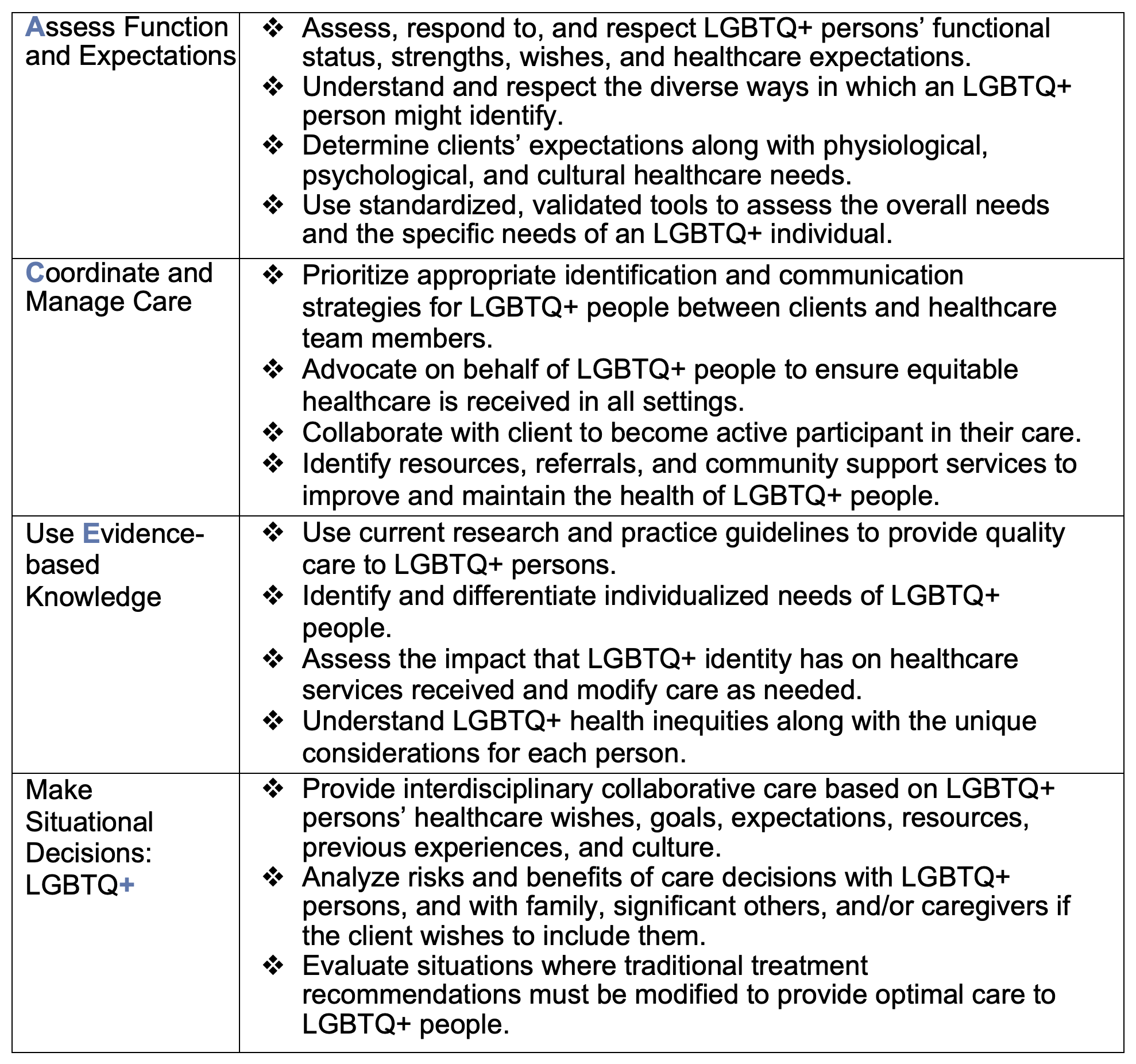ACE+ Framework

Adapted by Mikovits, J. from Tagliareni, E., Cline, D. D., Mengel, A., McLaughlin, B., & King, E. (2012). Quality care for older adults: Advancing Care Excellence for Seniors (ACES) Project. Nursing Education Perspectives,33(3), 144-149. doi:10.5480/1536-5026-33.3.144
Glossary of Terms for Health Care Teams
The National LGBTQIA+ Health Education Center, a program of the Fenway Institute, has created a glossary of terms relevant to the LGBTQ+ community. View the LGBTQIA+ Glossary of Terms for Health Care Teams.
Components of the ACE+ Framework
ACE+ Essential Nursing Actions
The Essential Nursing Actions provides a framework for nursing students and practicing nurses to translate their knowledge of individualized care, complexity, gender identities and sexualities, communication techniques, and vulnerabilities during life transitions into actions that promote high quality care for individuals and the entire LGBTQ+ community. Use of the materials that are part of ACE+ and essential nursing actions in clinical experiences, skills lab/simulation, and lecture develops students’ knowledge, skills, and abilities related to care of LGBTQ+ individuals while promoting positive perceptions and humility towards LGBTQ+ individuals.
ACE+ Knowledge Domains
Individualized Care
Individuals who identify as LGBTQ+ experience healthcare interactions which are manifested uniquely by each individual. Assessing function and expectations of care are essential.
The acronym “LGBTQ+” is often used as a broad term that is meant to capture this community as a whole, but it is important to note that each specific letter in the acronym represents a person who has individualized needs. Assuming gender and sexuality may lead to the belief that there is a typical way for people to identify and can lead to gender-normative and heteronormative care. LGBTQ+ individuals living in a wide variety of settings represent a broad spectrum of strengths, resources, needs, wishes, and expectations.
Communication with each LGBTQ+ person is essential to providing affirming individualized care by addressing them as a person. Use of proper name, gender, and pronouns are crucial parts of assessments and may change over the lifespan for each individual. Healthcare across the lifespan of LGBTQ+ people should recognize open communication, collaborative coordination of care, and profound respect for the preferences of LGBTQ+ people, their families, and caregivers that result in the uniqueness of each person’s life.
Complexity of Care
The care of LGBTQ+ people requires specialized knowledge in the art and science of nursing to manage the multitude of factors that influence quality of care.LGBTQ+ people represent nurses’ most diverse clients, yet nurses often unknowingly provide care to this population because of the lack of gender and sexual diversities in demographic screenings. Clinical experiences provided for students need to focus on how to recognize, respect, and respond to numerous interconnected factors that affect care, and the multiple variables that impact equity and the quality of care for LGBTQ+ people.
Early identification of preventable diseases may be missed if LGBTQ+ people avoid seeking care based on previous experiences of discriminative and inadequate care. The management of multiple co-existing acute and chronic conditions may generate tension between immediate and long term needs as well as healthcare providers and clients. Nurses should use judgment to observe, interpret, respond, and reflect, based on their knowledge and the LGBTQ+ persons’ or caregivers’ expectations.
Unfolding cases, simulations, and teaching strategies using ACE+ Essential Knowledge Domains and Nursing Actions facilitate the ability of nurses to care for LGBTQ+ people and their caregivers in a way that is respectful, competent, individualized, and humanistic.
Vulnerability During Transitions
LGBTQ+ people experience dynamic changes encompassing transitions across their lifespan including environmental, location, activity, legal, personal, or other life events. Transitions have the potential to create upheaval and disequilibrium for LGBTQ+ people and their families and they offer opportunities for nurses to intervene.
Coordinating care during significant life transitions for LGBTQ+ people is fundamental to providing competent, respectful, individualized, and humanistic care. Care must be more than a series of discrete services; rather, continuity of care must be provided when an LGBTQ+ individual moves among care settings. Communication between colleagues is vital to maintaining affirming care.
The professional identity of the nurse is clearly evidenced in nurses’ role as advocates for all people. As advocates for LGBTQ+ people and their loved ones, nurses have the ability to improve the quality of care provided, and to incorporate older adults’ and caregivers’ expectations for management of disease and promotion of health and healthcare equity.
Nurses must conscientiously and affirmingly focus on treating their LGBTQ+ clients as people by maintaining function, control, dignity, and integrity to promote their health, nutrition, function, safety, social interactions, independence, safety, and quality of life. Nurses help LGBTQ+ individuals and caretakers to make choices healthcare decisions in efforts to reclaim or develop new pathways toward equity and human flourishing.



